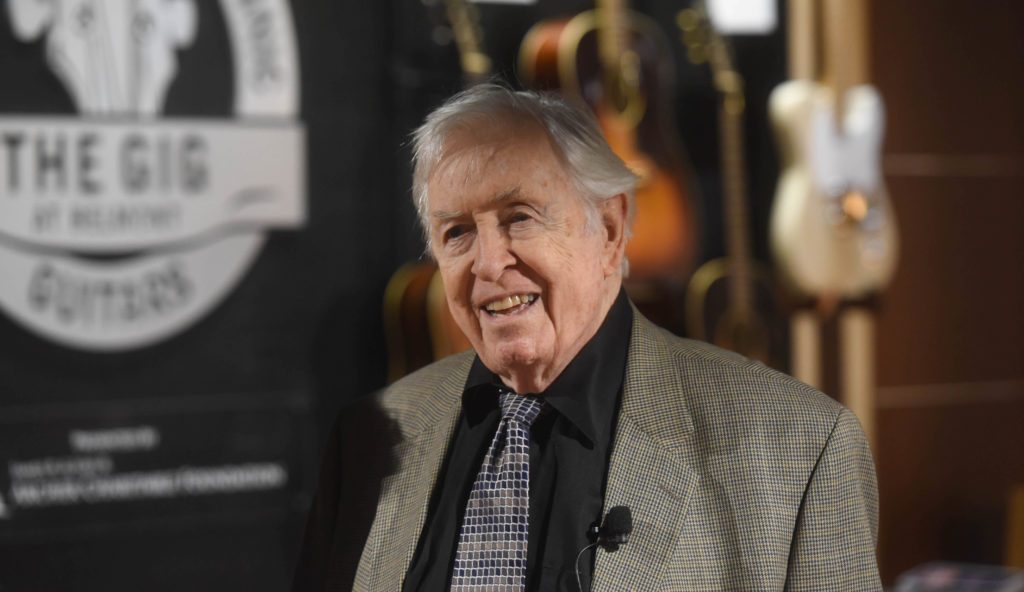
Last month, Bill Pursell celebrated his 94th birthday. Over the course of his 60-year career in Nashville, he’s worked with some of country music’s biggest names, including Chet Atkins, Patsy Cline, and Johnny Cash. At the same time, Pursell is a classically trained pianist, has performed as a soloist with the Nashville Symphony, and continues to compose.
In celebration of 91Classical’s Local Composers Month, we posed six questions to some of Nashville’s classical music creators. This week, we asked Bill about some of his first musical memories, as well as what he’s keeping busy with today.
When did you write your first piece of music?
When I was 4. I have a copy of it. My dad wrote it down for me, and he called it “Billy’s Orchestra.” And then when I saw how it was done, I started to scribble my own things when I was about six or seven, and I came up from there.
How would you describe your compositional style, and who are your biggest influences?
My influences are all over the place. I’m particularly fond of the Russian school— in particular Prokofiev. And that influence goes all the way back to when I was at the Eastman School of Music, and the style of my writing had definite hints of Russian music. Two of my favorite piano concertos are actually [Prokofiev’s] second and third. Also, I was raised not only listening to a lot of Russian music, but a lot of French music, and that was an influence, [Debussy’s] La Mer, and things like that. In fact, when I was a student studying for my doctorate, I used to go up into the library and look at Debussy’s original manuscript that he wrote back in 1903.
Are you working on any music projects right now?
Well I went into lockdown, you know, on March 1st, and I went ahead and finished some arrangements for an album I’m finishing with [my daughter] Laura, thinking that we’d be back in the studio in the fall. But it looks like we’re gonna be closed down for the rest of the year. But I have two pieces in mind that I want to write for orchestra. One called “Lockdown,” which I thought was a good title for right now, and the other called “Earth Rise.” If you remember the Apollo shot where they got the picture of the Earth coming up over the horizon of the moon— I was so inspired looking at that and this idea’s been germinating in the back of my mind for some time to do a tone poem for orchestra.
With so much experience and such a long career, what advice would you give to someone interested in composing?
Well, first of all, just try writing. If you have any knowledge of how to put down music on paper, see what you come up with. I had many, many students that started out just that way. They had the impulse they wanted to make something up, whether it was a tune, or if they had some knowledge of harmony and they could put it to a melody. My whole approach to that is, simply get out and try it. And then get to a teacher and see how it works. It’s sort of like painting: you get a canvas and you put oil on it, and after a while you get some semblance of order about the way you’re using your oils and things of this sort. And all of that comes from environmental influence. The more you listen to music, the more you’re going to write.
You worked with some really big names over the course of your career. Were there ever any moments that you were just totally star struck?
No, I never had that feeling because I was so busy doing my part in those sessions. And when I worked with Johnny [Cash], especially on “Ring of Fire,” I remember thinking at the time as I was playing the piano “What in the world are these lyrics about? Where are we going with this?” But I was so concerned about doing my part that I figured, well, whatever.
How about in the classical world?
I can tell you this, I did have the luck of running into a lot of different people who happened to be there when certain things happened. My teacher, Renée Longy, who I studied with at Peabody when I was 18, was there at the first performance of The Rite of Spring by Stravinsky when the riot started. She saw Debussy try to quiet people down in the orchestra section. And when Stravinsky came to town to give a lecture at Peabody, I remember standing there with a couple of other students, watching Stravinsky and Madame Longy discuss, in French, that performance that happened back in 1913. And I felt like I was looking at history.
Hear more about Pursell’s career in this 2019 interview with 91Classical and a recent Musician Spotlight at the Country Music Hall of Fame.